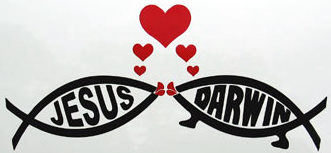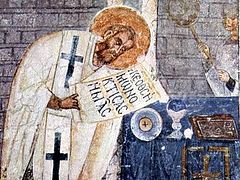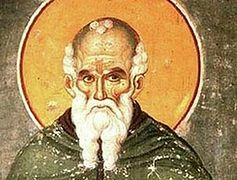Source: Apologia Pro Ortho Doxa
April 7, 2016

Theistic evolution is a path to apostasy.
By no means am I claiming that all or most theistic evolutionists are apostates. Nor am I claiming that all will become apostates. On the contrary, I know many who know and love Jesus Christ. What I am saying, however, is that theistic evolution is inherently unstable, that it contains within itself the seeds of theological liberalism, and that for those who are willing to think seriously through its implications, it will ultimately destroy the Christian faith. The most prominent model of such a person is likely Peter Enns. Peter Enns started out as a professor of biblical studies at Westminster Theological Seminary. He strongly affirmed theistic evolution, and even worked for BioLogos. Yet, Enns perceived that if evolution was true, then it demanded a thorough rethinking of Christian faith and life. If there is one true world, and evolution is part of that world, then:
1. Death is not contingent. Death is part of the universe. It has always been part of the universe. Man did not bring death into the world because death was always in the world.
2. Sin is part of what it means to be human. What it means to be human gradually developed over millions of years as successive generations became more adapted to their environments. Part of that adaptation was sexual promiscuity, since it ensures that your genes are spread more widely. Another part is violence against other communities, since that ensures a higher probability that your own community (and thus, genes) will survive.
Another route one could take towards #2 is to assert that such tendencies are limited to our bodies, but not our souls. But this leads inevitably towards Gnosticism, since Christianity asserts that God is the creator of soul and body in His image and likeness. If one’s Christianity is reshaped around the above two propositions, then I’m afraid there’s very little left, as there is for Enns, who is a sad, dejected man. But let’s take this a little further:
What does theistic evolution imply about the Bible?
Conservative theistic evolutionists desire to section Genesis 1-11 neatly away from the rest of Scripture and to assert specious differences in genre between Genesis 1-11 and Genesis 12-50. We are then informed that we are very poor readers of Genesis if we do not recognize such a difference in genre. Yet, ancients such as Josephus recognized no such difference. Jesus and the apostles apparently believed that Adam and Noah were real people. Both Jews and Christians have a long tradition of building a chronology out of, in part, the genealogies of Genesis 5 and 11. Moreover, Abraham’s descent is traced right back to Noah, the same Noah who experienced a global flood.
Others try to reinterpret Genesis 1-3 and Genesis 6-9. Frankly, such attempts barely deserve discussion. Every interpreter that lived before the 19th century recognized that the Flood of Genesis 6-9 is a global flood. The text is designed to recapitulate the seven days of creation so as to present the same world that was made in Genesis 1 to be torn apart. All the high mountains were covered. Noah builds the ark as a miniature world and gathers all the animals in the big world into the little world. Is it true? Or is this false?
What about Genesis 1? Though some evangelicals have attempted to assert that it was never intended as historical because of its literary design, everything in the Bible is designed as literature. Symbolism communicates truth about the real world. The creation is a living allegory of Jesus Christ. The text of Scripture expresses the truth about Christ precisely in that it expresses the truth about the world in which He is symbolized. If Genesis 1-11 are intended as history, and Genesis 1-11 are false, then the whole history of salvation begins to fall. The chronology of the ancient world, based on the idea of an “agricultural revolution” in 8000 BC, presses away the Bible. Attempts to find room for the exodus (read the account of the plagues: Egypt was destroyed) in the conventional chronology are sad and doomed.
The accounts of the patriarchs are intimately woven into the details of Genesis 1-11, and the exodus is dated with respect to the patriarchs. Even David and Solomon are dated with respect to the exodus, and the kings are dated with respect to David and Solomon. It is here, with the kings, that conventional biblical scholars see Israel’s history as emerging from the dark mists of myth. But the meaning of the Davidic kingship only makes sense in light of what came before. Jesus’ story only makes sense with respect to the story of Israel.
To use a rather morbid analogy, theistic evolution reminds me of Jackie Kennedy trying to stuff the brains back into John after he was sniped in the head. There’s no way to reconstruct the pieces. A less morbid analogy would be Doc. Ock’ from Spiderman: the artificial sun he created was inherently unstable. He could use his arms to maintain control of the instabilities for a short period of time, but soon enough, the instability was going to break out of the containment chamber and bring the city down.
Darwinism is antithetical to everything the gospel is about. Don’t go down that road.




I agree with you that physics and cosmology provide the most serious challenge. But I think that enough fruit has been generated in other fields, especially given the relative lack of funding and small cadre of serious creationist scientists, to be promising as to the fruitfulness of the entire paradigm. Some creationists have developed cosmologies based on relativity which reconcile the data you mentioned to a young earth, but with the clocks in the rest of the universe having been faster with respect to our own clock in the creation week, so that other stars are genuinely billions of years old. The two models are Humphreys' model (his newer model is different than his older one) and the lesser known Hartnett "5D cosmology" model.
Personally, I don't think either of these are likely correct. I still think the real solution is to come. My claim is that there is precedent of progress and that, given other reasons for creationism, there is reason to think this problem will eventually be solved. See here:
http://www.pravoslavie.ru/english/93210.htm
We have not observed billions of years, only the evidence, IF, the atomic clocks have been constant, and there is good evidence that they have not.
1. A universe that is only 7-8000 years old is not physically possible and could not be stable.
2. We can observe directly, even with the naked eye, objects that must be at least 2 million years old - because that is how long it takes light to get here.
Our interpretation of scripture HAS to be consistent with obviously observable physical facts.
I would like to add a lot more here - but the comment space is limited.